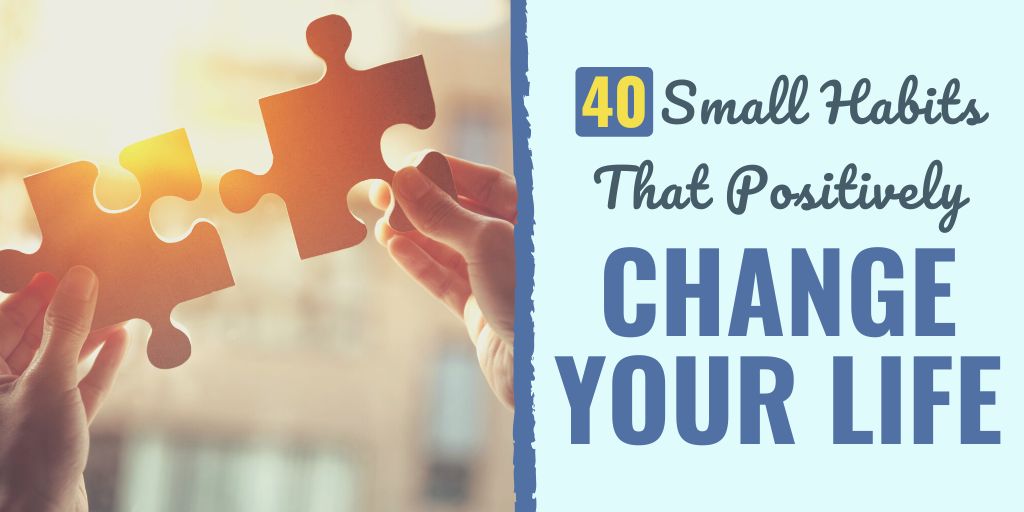I’m sure that you’ve heard the expression: Old habits die hard.
The earliest citation of this saying is in an article written by Benjamin Franklin back in 1758 that was printed in the London Chronicle–however, the expression has been traced back to the 1400s.
The deep-rooted use of this saying goes to show that people truly are resistant to change. It involves a process to effectively change your habits and adopt a new routine, and the idea of embarking upon this journey can be exhausting.
However, the good news is that it is within your power to make the decision to change your life.
Thinking back to my health 15 years ago versus my health today, it wasn’t one thing that I changed overnight that made both my physical and mental health do a complete 180.
There were so many small factors that came together over the course of several years that had an enormous impact on my wellbeing.
In hindsight, I can see the progression that each small habit change made, but the whole change certainly ended up being greater than the sum of its parts.
In this article, I am going to talk about the compounding effect of small habit changes and how positive behaviors can work together to have a great impact on your life. Then, I will give 40 examples of small habits that you can incorporate into your life that can contribute to a big difference in the long run.
How Change Really Occurs
One quick thing to note before we get into this is the juxtaposition between this idea of making small changes to eventually reach a long-term goal and our current society’s infatuation with instant gratification, hacks, and quick fixes.
The truth is, nothing that can be acquired immediately is sustainable, and if you want to make a true impact on your life, you have to put in the work that is required. If this weren’t true, everyone in the world would be physically fit, rich, and happy.
Another thing to keep in mind is that the immediate satisfaction you get from eating that burger and fries outweigh the idea of the long-term benefits of eating a salad at the moment that you are faced with the choice.
When you give in to your bad habits, it doesn’t feel like it will negatively impact your future at that very moment. However, all of your seemingly insignificant behaviors add up over time to create who you are as a person and define what your future will look like.
So let’s look at how change really occurs.
When you think of the word “compounding”, your mind may go directly to money and positive returns over time.
As you probably learned in school, compounding in finance refers to the process of an asset’s earnings slowly generating as it gains interest. Compounding can also work in the opposite direction if you’re losing money on an investment.
But this principle also works outside of the financial world.
(Side note: One small positive habit that you can add to your life is to learn something new every day. A great tool to do this is to join over 1 million others and start your day with the latest news from Wall St. to Silicon Valley. This newsletter is a 5-minute read that's informative, witty and FREE!)
Just like your investments compound with time, so do your everyday habits. If your habits are positive, they will take you in one direction, and if they are negative, you will follow a different path.
Your habits are the “compounding interest” that lead to your personal development. Just like money accumulates through positive compounding interest, the impact of your habits increases as you repeat them.
However, it is only when you look back months or years later that you can recognize the valuable impact of your habits or the cost you have paid.
Consider this: If you’re trying to lose weight and you do nothing aside from replacing your afternoon soda with sparkling water (or cutting out 150 calories per day in some other way), you will be reducing your caloric intake by 54,750 calories in one year, which is equal to almost 16 pounds.
And think about what you could achieve if the number of calories you cut out was even more than that.
You will gain success in your small, everyday decisions that, in the moment, will give you no tangible results. However, the compounding effect over time can be radical. Even though the results of your efforts are profound, in the moment, your actions don’t feel significant.
The changes you make each day are so subtle that they’re almost undetectable, which means you have to work consistently and have faith in the fact that your results will only show up down the road. This in itself requires patience, dedication, and commitment through the process.
While it can be hard to get started on a new habit, once you do it enough, it will become second nature. If you stay consistent, your momentum will keep moving forward.
You may have the best of intentions, but you won’t succeed if you don’t have a system in place to execute them. Your daily behaviors have to be reflective of your ultimate goal to cause any real change.
So how can you apply the compounding effect to your life? Let’s look at 40 small habits that you can adopt that can make a big difference in your life.
40 Small Habits that Make a Big Difference
1. Schedule Your Day
Scheduling your day involves planning your tasks ahead of time so you can achieve your goals in an allotted amount of time.
When you’re able to schedule effectively and stick to your plan, it helps you determine your priorities and make the best use of your day. Over time, you will have found that you’ve been able to meet (and possibly exceed) your goals and make significant progress in your life.
2. Complete Your Hardest Task First
Identifying the most daunting task on your to-do list and getting it over with right away will allow you to feel a sense of relief that makes everything else on your schedule for the day seem simple in comparison.
Also, focusing on your hardest task probably means that you’re focusing on the task that will bring you the most benefit in the end.
3. Break Down Your Big Goals Into Smaller Goals
Projects or goals often seem so overwhelming that it can be hard to know where to start, which can lead you to put the project off again and again until the entire idea seems stale.
If your ultimate goal is to read 25 books this year, break that down into monthly tasks and assign which books you are going to read each month. These smaller goals will seem more attainable and approachable.
Achieving your goals often requires a daily slog of repeating the same action over and over. Ultimately, it’s your habits that will make or break your success with a goal. The video below shows you exactly how to turn your SMART goals into simple habits:
4. Keep Your Living and Work Space Clean
Trying to live or work in a chaotic environment is distracting and can be very stressful. Take the time to put things away after you use them or do a quick clean-up of your desk before leaving work.
Maintaining the cleanliness of your environment will prevent junk from accumulating, so you won’t end up having to spend an entire day (or more) purging your belongings.
5. Unsubscribe
How much time do you spend weeding through emails that you have no interest in reading?
To avoid the stress of waking up to a huge number next to your inbox, unsubscribe from any email list that you can. This will start your day off without that initial shock that you probably feel when you see that number.
6. Track Your Expenses
While this may seem tedious, it is possibly the most influential financial decision you can make in the long run. When you write down everything that you (and your family) spend money on, you can see where you’re wasting money and what you can cut out.
A common example of a money pit that comes up is paying for coffee every morning from a coffee shop rather than making it at home. But no matter what your money pit is, it will be easier for you to recognize it if you have all of your expenditures written down.
7. Keep a Food Journal
Similar to tracking what you spend, you can track what you eat. Keeping a food journal is a keystone habit that will make you more conscious of the food you’re choosing because you will know that you have to write down whatever it is that you’re putting in your mouth.
Be honest with yourself while maintaining your food journal and don’t forget to record your portion sizes. This will also help you recognize how much you’re eating during the day and it could help you realize that you don’t actually need that mid-morning snack.
8. Read Every Day
Reading has a ton of benefits such as helping you continuously improve your cognitive function, improving your creativity, and decreasing stress.
All of the small benefits of reading add up in the long run to slow the progression of age-related cognitive decline and diseases and help you remain a lifelong learner.

9. Complete a Puzzle
Working on puzzles every day has huge long-term benefits. It can help improve your memory, enhance your problem-solving skills, increase your IQ, and delay diseases such as Alzheimer’s and dementia.
Additionally, studies have shown that working on puzzles with someone else can help improve your collaboration and relationship skills.
10. Go Outside
Aside from getting your daily dose of vitamin D, being outside during the day and exposing yourself to natural light can help improve your sleep by regulating your sleep/wake cycle. Further, spending time outside can decrease symptoms of depression and increase calmness and mental clarity.
11. Make Your Bed
The task of making your bed seems so minor, but it can actually have a pretty big impact on the rest of your day. Making your bed allows you to start your day by completing a task, which will set the pace for the rest of your day.
Not only will you feel a sense of accomplishment, but you will also feel a relief of stress as your living space becomes tidy.
12. Purge Your Phone
Delete apps on your phone that you don’t use anymore and transfer your pictures to a more permanent place. Not only will this allow more space on your phone for new data, it will also help you get organized and protect your photos or documents in case you lose your phone.
13. Write in a Journal
Whether you choose to create a gratitude journal, a diary-type journal, or a food journal, take the time to write in it every day. No matter what type of journal you keep, writing in it will help you focus on the present moment and organize your thoughts and ideas.
14. Offer Someone a Compliment
When you make it a point to offer a genuine compliment every day, you will find that you’re constantly looking for the good in people.
You don’t want to make shallow or fake compliments, so you may also find that you start to pay more attention to people in order to pick up on their strengths. Giving compliments can help reinforce your positive relationships and even boost your self-esteem.
15. Take Pictures
Document your life by taking pictures of anything important or relevant that you come across during the day.
Not only will this give you a timeline of your life in the future, it will also help you pay more attention to the everyday details of your life that may seem insignificant at first, but are actually the events that make up who you are.
16. Dress the Part
Take the time each morning to dress for the position that you want, not the position that you have.
This will help people perceive you as being a higher-up professional, which can benefit you as positions become available within your company. Dressing for success will also help boost your confidence each day.
17. Volunteer
Volunteering your time is often what organizations need the most. Find a local organization that you are passionate about and see what you can do to help them work toward their mission.
Not only will this help out other people, it will also help you feel good about yourself. Helping to improve your community has a widespread compounding effect.

18. Recycle
If there is one thing that we really want to improve for the future, it’s our environment, as a negative compounding effect could be detrimental to our future generations.
Recycling can help reduce your carbon footprint by reusing materials and reducing the amount of trash that you add to landfills.
19. Grab the Farthest Parking Spot
Park as far away as you can from your office, the grocery store, or wherever you’re headed. This will force you to get some more physical activity in during the day and help you counteract the impact of a sedentary lifestyle.
20. Ask Open Ended Questions
Improve your conversations by asking questions beyond those that solicit a simple yes or no answer.
Ask open-ended questions about events and keep your perspective open to hearing what they have to say. Learning about what other people think can help you develop empathy and put your own life and experiences into perspective.
21. Add a Raw Fruit and Vegetable to Every Meal
This will help you “eat the rainbow” and ensure that you’re giving your body the nutrition that it needs.
Eating natural food rather than man made products that have been produced in a factory is one of the best ways to make sure your body will be healthy for as long as possible.
22. Do Random Acts of Kindness
You can easily spread joy by doing random acts of kindness for other people that are completely unexpected. Whether it is a stranger, a co-worker, or even your spouse, doing sudden favors for other people can help inspire them to do the same, which will ultimately reduce the amount of negativity in our world.
23. Say Daily Affirmations
Repeating positive affirmations can eliminate negativity from your life and help you appreciate the things that you have. These simple messages that you tell yourself can transform your thinking–and often your reality.
Positive affirmations help you be more positive, which often leads to success. Check out these blog posts to inspire you to make your own affirmations:
- 101 Daily Motivational Positive Affirmations
- 87 Self Love Affirmations To Improve your Life & Build Your Confidence
- 30 Affirmations for Setting and Achieving Goals
24. Practice Active Listening
When you’re talking to someone, make sure you’re making the effort to really hear what they’re saying. Engage in active listening by not interrupting the person who is talking to you and asking follow-up questions to show your interest in what they’re saying.
Fully engaging yourself in conversations will help you build trusting relationships with others. (Side note: Here are our favorite songs about change to give you a bit of inspiration.)
25. Do Something to Make Yourself Happy
Practicing self-care is so important in our chaotic lives because we can’t help other people or produce our best work unless we take care of ourselves first. Take the time to learn what really makes you happy and make it a point to engage in that activity on a regular basis.
26. Get Rid of Something
By either donating, selling, or throwing away an item a day, you can reduce clutter and possibly earn back some money on an item that you no longer use.
This will help create more space in your home and it will probably lead you to think twice before making purchases in the future knowing that you’re trying to get rid of things rather than accumulate them.
27. Learn a New Word Each Day
Stimulate your brain every day by learning a new word and using it in your vocabulary. This will help strengthen your communication skills and possibly give you a boost of confidence in social situations.
You can learn a new word every day by subscribing to an email service such as A.Word.A.Day or getting a daily calendar that teaches new words. Just be sure to nail the pronunciation before using the word in a conversation.

28. Pack Your Lunch
Not only will packing your lunch for work save you money, it can also help you lose weight if that is a goal that you’re trying to reach.
It may not seem like a big deal to spend $10 today on lunch, but think about the impact that being able to put an additional $50 a week in your savings account could have on your finances. You could end up saving thousands of dollars with this one small habit change.
29. Wear a Pedometer
If you begin the habit of wearing a step-tracking device, chances are pretty high that you will start to find new ways to be active throughout the day.
Studies have found that wearing a pedometer can help you increase the distance that you walk each day by about a mile, which is a 27% increase in physical activity per day for the average person, which can definitely add up over time.
30. Meditate
Take a few minutes each day to meditate. This will help reduce stress and improve your focus. Reducing tension in your body and relieving stress now can help lower your chances of developing depression later in life and can help fight age-related memory loss.
31. Make a New Contact
This doesn’t have to be a business contact–although it certainly can be. Making a habit of meeting new people and expanding your network will come in handy down the road during a time when you least expect it.
While you may have to step out of your comfort zone to actively meet new people, do it as much as you can so you can learn about other people’s experiences and improve your own conversation skills.
32. Return Any Missed Calls and Texts
Not only does it show respect for the person who tried to contact you, it also shows that you have proper communication skills when you take the time to return a call, text, or email.
Even if you feel like you don’t have a free moment to spare, don’t compromise the trust in your relationships by ignoring those who reach out to you.
33. Wear Sunscreen Every Day
The UV rays from the sun can damage your skin whether it’s the middle of summer and you’re on the beach or if you’re bundled up in winter clothes.
Wearing sunscreen will ensure that your skin remains healthy, youthful, and free from wrinkles for years to come. It may not seem like a big deal to skip a day of wearing sunscreen, but the impacts can be huge, as a single sunburn can increase your chances of developing melanoma.
34. Create a Bedtime Routine
Getting proper sleep is an essential component to your overall health, but one in three Americans don’t get the amount of sleep that they need.
If you create a bedtime routine and stick to it, you can help your body prepare itself to fall asleep every night, which will prevent you from laying awake feeling tired and frustrated well past a reasonable bedtime.
Getting sufficient sleep on a regular basis can improve your cognition, heart health, and emotional wellbeing.
Not only that, an evening routine closes out the “open loops” for the day and gets you ready to tackle the next day. Watch the video below to learn the 9 evening routine habits of the world’s most successful people:
35. Sit Up Straight
Maintaining good posture can have a huge impact on your physical wellness. The best way to improve your posture is to be mindful of your body during the day.
Do you lean forward to reach your keyboard? Do you keep your shoulders back when you’re sitting at a red light? How is your weight distributed when you’re standing?
Correcting your posture will reduce future muscle pain and overuse disorders.
36. Practice Deskercise
To decrease the amount of time you are spending being sedentary at your desk, incorporate exercises into your day that you can complete right at your desk.

Learning and practicing some exercises that you can do while you’re at work can help strengthen your body instead of having your muscles waste away.
37. Plan Your Meals Each Week
Planning your meals for the week every Sunday will help you avoid running through the drive-through in the middle of the day or ordering an emergency pizza after work.
Taking control of your diet in this way will help reduce your weekly expenditures and allow you to make healthier choices, which will help you achieve the two very common goals of saving money and losing weight.
38. Conserve Utilities
Turning off the lights when you leave a room or changing the temperature of your home when you’re not there in order to save energy will save you a lot of money in the long run.
Powering down electronics and using cold water whenever possible can all lead to a big reduction in your utility bill.
39. Outsource When You Can
Improve your performance by spending as much time as possible on your most important tasks. Because you can’t work on two things at once, this will involve delegating some of the tasks on your list of things to do to other people.
If you have someone who works for you, it is easy to teach them how to do some of the small or mundane tasks that you have to do on a regular basis so they can take those off of your plate.
40. Reward Yourself For the Small Wins
Whenever you practice a habit that will help you reach your ultimate goal— no matter how small the action is— take a moment to recognize your efforts.
This will help keep you motivated, keep your momentum up, and prevent you from feeling burnt out. Do whatever you find to feel rewarding to help maintain your enthusiasm about working toward your goal.
Final Thoughts on Small Habits
Your life is a reflection of the cumulative results of the choices you have made up to this point. If you want to change something about your life, you have to change something about your everyday choices.
If you find yourself tempted to engage in a negative action, consider whether or not that action will bring you closer to your ultimate goal or not. If you start making poor decisions, rationalizing your excuses, and repeating small mistakes, these little choices will add up to destructive results.
Try to incorporate as many of the habits listed in this article into your life as possible. By doing so, you will be setting yourself up for a successful future.
And if you're looking for more resources on small habits that will help you succeed, be sure to check out these blog posts:
- 13 Success Habits of Self-Made Millionaires
- 9 Benefits of Journaling on Your Health and Mental Well-Being
- How to Start Journaling and Stick to It [The Ultimate Guide]
Finally, if you need help with building habits, then check out this nine-step blueprint that walks you through the entire process of creating lifelong habits.)

Connie Mathers is a professional editor and freelance writer. She holds a Bachelor's Degree in Marketing and a Master’s Degree in Social Work. When she is not writing, Connie is either spending time with her daughter and two dogs, running, or working at her full-time job as a social worker in Richmond, VA.



This is great! I went through a mad cleaning phase when we moved into our new apartment. It felt so good to be “lighter.” We really keep so many things for no other reason than we feel uncomfortable with getting rid of them. I still have a ways to go, but the seed has been planted.
Great article. You made me look around and indeed I need to clean house. I enjoy holding on to stuff many just for memories sake but now I have to reevaluate the true reason I am holding on to things that I have no need for and will never use.
Thakns for the eye opener.
This is so true. I had been hoarding worthless junk for years until moving from a house to a ground floor flat made me either give to charity or throw out. It made my energy so much lighter afterwards. I also believe that discarding items you don’t need creates space in your life for new positive changes. A tidy home is a tidy mind.:)
Thaznk yоu for proѵiԁing with y᧐ur content, absolutely that iѕ some thing various with other web
page, and i have been long time hunting concerning this particular blog post.
i really hоpe you keep producing this way and more
greater . God Lucky you.
Couldn’t agree more by all these points, Great post . it has literally made me think to do all the necessary changes.Thank you so much!